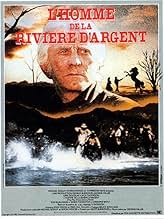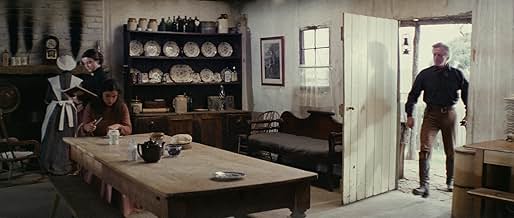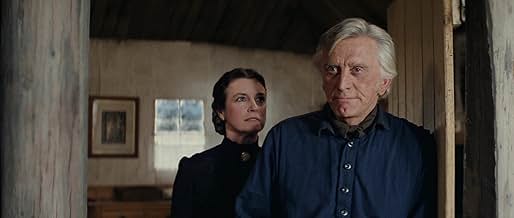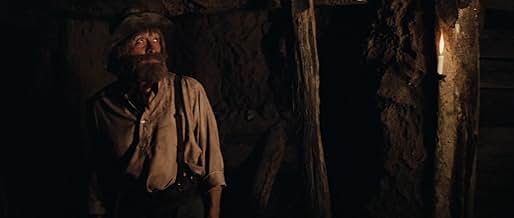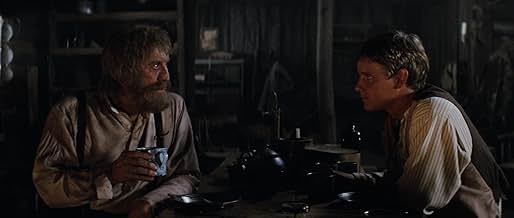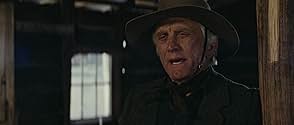IMDb रेटिंग
7.2/10
11 हज़ार
आपकी रेटिंग
अपनी भाषा में प्लॉट जोड़ेंIn 1880s Australia, after young Jim Craig's father dies, he takes a job at the Harrison cattle ranch, where he is forced to become a man.In 1880s Australia, after young Jim Craig's father dies, he takes a job at the Harrison cattle ranch, where he is forced to become a man.In 1880s Australia, after young Jim Craig's father dies, he takes a job at the Harrison cattle ranch, where he is forced to become a man.
- निर्देशक
- लेखक
- स्टार
- पुरस्कार
- 2 जीत और कुल 3 नामांकन
फ़ीचर्ड समीक्षाएं
I must confess that I watched this film because I am a Kirk Douglas fan and I certainly was not disappointed in the dual performance he gives as two brothers, one an owner of the Australian equivalent of the Ponderosa and his hermit brother who lives up in the mountains among the wild horses and befriends young Tom Burlinson who becomes the man from Snowy River.
The film is a dramatization of a wild horse roundup such as you would have seen in the American West although American fans might be first thrown by use of the Aussie term 'brumbies'. What the origin of that idiom is I don't know, but for us Yanks just think 'mustang' and it will all become clear.
In fact I just finished a book on Australian general Sir Thomas Blamey and it is mentioned that during his boyhood in Wagga Wagga, he broke and rode 'brumbies.'
And of course the title and part of the plot is based on A.B. "Banjo" Patterson's poem. Patterson himself appears as a passing character in the film and presumably he was inspired by the incidents to write that poem.
Patterson for Australians is sort of a combination of Bret Harte and Mark Twain for Americans. That poem has a nice style and hopefully the poem The Man From Snowy River will be come as known in the western world at large as say Tennyson's Charge of the Light Brigade or Kipling's Gunga Din. In fact like in this film, Rudyard Kipling appears as a passing character in George Stevens's Gunga Din and fulfilled the same function there.
If the Australians felt they needed someone with the international star status of Kirk Douglas to open up the foreign market for this film, all well and good. I just hope Kirk's presence in the film did just that for this fine piece of entertainment.
And this review is dedicated to a couple Australian bull riders from the Professional Bull Riders whom I happened to meet, champions from the land down under, Jared Farley and Brendan Clark. No doubt descendants of the men who rode and broke those brumbies back in the day.
The film is a dramatization of a wild horse roundup such as you would have seen in the American West although American fans might be first thrown by use of the Aussie term 'brumbies'. What the origin of that idiom is I don't know, but for us Yanks just think 'mustang' and it will all become clear.
In fact I just finished a book on Australian general Sir Thomas Blamey and it is mentioned that during his boyhood in Wagga Wagga, he broke and rode 'brumbies.'
And of course the title and part of the plot is based on A.B. "Banjo" Patterson's poem. Patterson himself appears as a passing character in the film and presumably he was inspired by the incidents to write that poem.
Patterson for Australians is sort of a combination of Bret Harte and Mark Twain for Americans. That poem has a nice style and hopefully the poem The Man From Snowy River will be come as known in the western world at large as say Tennyson's Charge of the Light Brigade or Kipling's Gunga Din. In fact like in this film, Rudyard Kipling appears as a passing character in George Stevens's Gunga Din and fulfilled the same function there.
If the Australians felt they needed someone with the international star status of Kirk Douglas to open up the foreign market for this film, all well and good. I just hope Kirk's presence in the film did just that for this fine piece of entertainment.
And this review is dedicated to a couple Australian bull riders from the Professional Bull Riders whom I happened to meet, champions from the land down under, Jared Farley and Brendan Clark. No doubt descendants of the men who rode and broke those brumbies back in the day.
We often think of the Western as being a characteristically American film genre, although there have been occasional attempts to adapt its conventions to stories set in other parts of the world. "North-West Frontier", for example, is a British film set in British-ruled India, but the plot is essentially that of "Stagecoach". "Untamed" transfers the standard waggon-train plot from the American prairies to the South African veldt, and "The Sundowners", about Australian pioneer life, has similarities to many films set in the Old West. These two latter films, despite their ostensible setting, had an American leading man, Tyrone Power in "Untamed" and Robert Mitchum in "The Sundowners".
"The Man from Snowy River" is another Australian film with a plot which could be that of a Western. (One could call it a "Southern"). It also features a major American star, in this case Kirk Douglas, in a leading role. Or perhaps I should say that it features Kirk Douglas in two leading roles, the brothers Harrison, a wealthy cattle farmer, and Spur, a prospector. The action takes place in Victoria during the 1880s. Apart from the two brothers, the main character is Jim Craig, the "Man from Snowy River" himself. Jim is a young man orphaned by the death of his father in an accident, who goes to work on Harrison's station. The three main strands of the plot concern the relationship between the two brothers, who have been estranged for many years, the growing romance between Jim and Harrison's daughter Jessica, and the efforts to recapture a valuable stallion belonging to Harrison, which has escaped and is running with a herd of wild horses.
There are a number of differences in terminology; the wild horses are referred to as "brumbies" rather than "mustangs", Harrison's landholding is described as a "station" rather than a "ranch" and the reward for the recapture of the stallion is expressed in pounds rather than dollars. With those and a few other exceptions, however, the above synopsis could easily be that of a typical Western. And yet in some ways this is a very Australian film. The title and the story of the hunt for the escaped stallion derive from a narrative poem by the "bush poet" Banjo Paterson, although the other two strands of the plot are the inventions of the scriptwriters. Paterson himself appears as a character, as does Clancy of the Overflow, the hero of another of his poems. Paterson is something of a national icon in Australia, largely because his poetry helped to create the legend of the "Australian bushman", the tough, individualistic inhabitant of the Outback who plays a role in the Australian national imagination similar to that played by the cowboy in the American one. Clancy himself- a real individual, not a fictitious character- has come to be seen as the archetypal bushman.
"The Man from Snowy River" was made in 1982 during a decade when very few traditional Westerns were being made in America itself. (Perhaps the attraction of the film for Douglas was that it gave him a chance to star in one last "Western"). This was, however, a period when the Australian "New Wave" was starting to give that country its own cinematic identity with films about Australian history like "Picnic at Hanging Rock" and "Breaker Morant". This film, therefore, can be seen, not as an attempt to imitate Hollywood, but rather as an attempt to celebrate Australia's own history and culture in the way that the Western celebrated American history and culture. That other great celebration of the bushman, "Crocodile Dundee", a comedy with a contemporary setting, was to come shortly afterwards.
There are no really great acting performances, although Douglas copes well with the challenge of playing two very different characters, the autocratic, patrician Harrison and the more free-spirited Spur, even if his accent does not always hold up. The film is shot against some attractive mountain scenery, and the action sequences, especially the hunt for the missing stallion, are well done. This is a film which will appeal to anyone with an interest in Australia's past, as well to all horse-lovers. 7/10
"The Man from Snowy River" is another Australian film with a plot which could be that of a Western. (One could call it a "Southern"). It also features a major American star, in this case Kirk Douglas, in a leading role. Or perhaps I should say that it features Kirk Douglas in two leading roles, the brothers Harrison, a wealthy cattle farmer, and Spur, a prospector. The action takes place in Victoria during the 1880s. Apart from the two brothers, the main character is Jim Craig, the "Man from Snowy River" himself. Jim is a young man orphaned by the death of his father in an accident, who goes to work on Harrison's station. The three main strands of the plot concern the relationship between the two brothers, who have been estranged for many years, the growing romance between Jim and Harrison's daughter Jessica, and the efforts to recapture a valuable stallion belonging to Harrison, which has escaped and is running with a herd of wild horses.
There are a number of differences in terminology; the wild horses are referred to as "brumbies" rather than "mustangs", Harrison's landholding is described as a "station" rather than a "ranch" and the reward for the recapture of the stallion is expressed in pounds rather than dollars. With those and a few other exceptions, however, the above synopsis could easily be that of a typical Western. And yet in some ways this is a very Australian film. The title and the story of the hunt for the escaped stallion derive from a narrative poem by the "bush poet" Banjo Paterson, although the other two strands of the plot are the inventions of the scriptwriters. Paterson himself appears as a character, as does Clancy of the Overflow, the hero of another of his poems. Paterson is something of a national icon in Australia, largely because his poetry helped to create the legend of the "Australian bushman", the tough, individualistic inhabitant of the Outback who plays a role in the Australian national imagination similar to that played by the cowboy in the American one. Clancy himself- a real individual, not a fictitious character- has come to be seen as the archetypal bushman.
"The Man from Snowy River" was made in 1982 during a decade when very few traditional Westerns were being made in America itself. (Perhaps the attraction of the film for Douglas was that it gave him a chance to star in one last "Western"). This was, however, a period when the Australian "New Wave" was starting to give that country its own cinematic identity with films about Australian history like "Picnic at Hanging Rock" and "Breaker Morant". This film, therefore, can be seen, not as an attempt to imitate Hollywood, but rather as an attempt to celebrate Australia's own history and culture in the way that the Western celebrated American history and culture. That other great celebration of the bushman, "Crocodile Dundee", a comedy with a contemporary setting, was to come shortly afterwards.
There are no really great acting performances, although Douglas copes well with the challenge of playing two very different characters, the autocratic, patrician Harrison and the more free-spirited Spur, even if his accent does not always hold up. The film is shot against some attractive mountain scenery, and the action sequences, especially the hunt for the missing stallion, are well done. This is a film which will appeal to anyone with an interest in Australia's past, as well to all horse-lovers. 7/10
The Man from Snowy River may not be the best acting, the best directing or the most exciting movie around, but it is one of the most magical. I loved it when I first saw it as a child and it is still one of my favourite movies at 31 years of age. I think the thing which makes it so special is that it doesn't have violence, nudity or profanity that so many movies have now in order to make them exciting. It is simply a nice old fashioned family movie that has a timelessness about it, like any of the classics. They simply don't make them like this anymore - unfortunately.
Shawshank is superb. Roman Holiday is perfect. Raiders is a blast. But The Man from Snowy River has been, is, and always will be my favorite movie. Some movies just match your personality more than others, trumping any technical deficiencies they may have. No, Snowy River doesn't have the best acting, the best screenplay, the best direction. But in all of them it's great, and the combination of the story, the cast, the scenery, and music (Bruce Rowland deserved an Oscar for his score) is much greater than the sum of its parts. For me, it's everything a movie ought to be: uplifting, heartwarming, optimistic, romantic, adventurous. It swept me away when I was 13 and its magic hasn't dimmed at 34. What a wonderful movie.
Clint Eastwood and Unforgiven be damned. This is by far the best western of the modern era. Its an Aussie tale, but that does not disqualify it in my books. Lonesome Dove has its group as does Unforgiven. But George Miller's The Man from Snowy River is downright majestic.
There are no stagecoaches, revenge killings, poker games or joking jail hands. There isn't even a climactic standoff in a dusty old town. But there is the hand of a maiden to win and inner demons to slay. The climax isn't a shoot out with a band of criminals, but with a stallion and a lonely ride down a rocky mountain.
Director George Miller draws clear characters and honest human situations. He understands what a camera can do. Scenes of great power play out not in a tired miasma of gunfire or hokey soliloquies, but in the striations of muscle from a horse powering through rock in slow motion. George Miler is a poet. And the Man from Snowy River is a story that will stand the test of time. See it.
There are no stagecoaches, revenge killings, poker games or joking jail hands. There isn't even a climactic standoff in a dusty old town. But there is the hand of a maiden to win and inner demons to slay. The climax isn't a shoot out with a band of criminals, but with a stallion and a lonely ride down a rocky mountain.
Director George Miller draws clear characters and honest human situations. He understands what a camera can do. Scenes of great power play out not in a tired miasma of gunfire or hokey soliloquies, but in the striations of muscle from a horse powering through rock in slow motion. George Miler is a poet. And the Man from Snowy River is a story that will stand the test of time. See it.
क्या आपको पता है
- ट्रिवियाTom Burlinson had never ridden horses much before making this movie and when he took Denny over the cliff to go after the brumbies that was a one-take shot at full gallop down the cliff face.
- गूफ़At the end of the film when the brumbies are being driven toward a holding corral, the mare Bess and the colt are way out in front. They're domesticated, and they'd know that the ranch meant food and water, so they'd be more eager to return than the others.
- क्रेज़ी क्रेडिटA herd of wild horses stampede over the hills after the end credits.
- इसके अलावा अन्य वर्जनNBC edited 8 minutes from this film for its 1987 network television premiere.
- कनेक्शनEdited into Terror Nullius (2018)
टॉप पसंद
रेटिंग देने के लिए साइन-इन करें और वैयक्तिकृत सुझावों के लिए वॉचलिस्ट करें
विवरण
- रिलीज़ की तारीख़
- कंट्री ऑफ़ ओरिजिन
- भाषा
- इस रूप में भी जाना जाता है
- Herencia de un valiente
- फ़िल्माने की जगहें
- उत्पादन कंपनियां
- IMDbPro पर और कंपनी क्रेडिट देखें
बॉक्स ऑफ़िस
- बजट
- $35,00,000(अनुमानित)
- US और कनाडा में सकल
- $2,06,59,423
- US और कनाडा में पहले सप्ताह में कुल कमाई
- $6,94,126
- 7 नव॰ 1982
- दुनिया भर में सकल
- $2,07,08,426
- चलने की अवधि1 घंटा 42 मिनट
- ध्वनि मिश्रण
- पक्ष अनुपात
- 2.35 : 1
इस पेज में योगदान दें
किसी बदलाव का सुझाव दें या अनुपलब्ध कॉन्टेंट जोड़ें

टॉप गैप
By what name was The Man from Snowy River (1982) officially released in India in English?
जवाब

